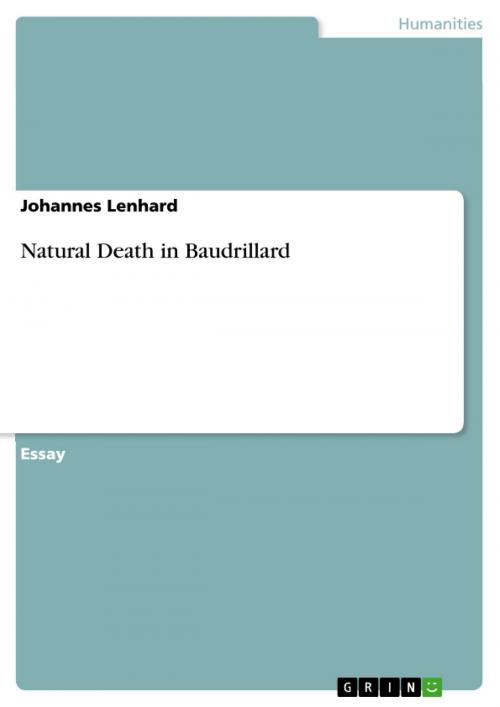| Author: | Johannes Lenhard | ISBN: | 9783656184478 |
| Publisher: | GRIN Publishing | Publication: | May 7, 2012 |
| Imprint: | GRIN Publishing | Language: | English |
| Author: | Johannes Lenhard |
| ISBN: | 9783656184478 |
| Publisher: | GRIN Publishing |
| Publication: | May 7, 2012 |
| Imprint: | GRIN Publishing |
| Language: | English |
Essay from the year 2012 in the subject Sociology - Classics and Theoretical Directions, grade: 2:1, London School of Economics, language: English, abstract: According to Baudrillard, the contemporary 'value system' is based on binary oppositions. The most vital of those are good and evil, man and machine and crucially important life and death. In our society, death is increasingly separated from life in stark contrast to what is still to be found in the 'primitive cultures'. Without being able to explain the alternative system - symbolic exchange - in its complexity, it is important to note its contrasting idea of 'a circular form, a circuit, reversibility' (Baudrillard, 2003: 16ff). In a symbolic system associated but not limited to 'primitives', death is not negativity, not endpoint but rather charged with symbolic meaning as part of a constant exchange procedure, always part of life. For us, death is 'abnormal' and we are constantly striving to extinguish it, make it 'extraterritorial' (Baudrillard, 1993: 126, 182) (e.g. in hospitals, out-of-town cemeteries, palliative clinics). In the following paragraphs, the essay will suggest a reading of Baudrillard's contrasting notion of 'natural death' that he claims to be 'everyone's right and duty'. In the first part, we give a close reading of Baudrillard's notion of natural death - without a primarily critical reflection. What will be suggested is that progress creates both the possibility for a natural, i.e. designed, death and its imperative. The critical reflection of part two will try to qualify Baudrillard's statements with a general critique of his ironic style and advance arguments with regards to content: How is it possible to close of individuality? Is it really a right for 'everyone'? Before this critical account can be appreciated, however, the notion of 'natural death' shall be explained in the following.
Essay from the year 2012 in the subject Sociology - Classics and Theoretical Directions, grade: 2:1, London School of Economics, language: English, abstract: According to Baudrillard, the contemporary 'value system' is based on binary oppositions. The most vital of those are good and evil, man and machine and crucially important life and death. In our society, death is increasingly separated from life in stark contrast to what is still to be found in the 'primitive cultures'. Without being able to explain the alternative system - symbolic exchange - in its complexity, it is important to note its contrasting idea of 'a circular form, a circuit, reversibility' (Baudrillard, 2003: 16ff). In a symbolic system associated but not limited to 'primitives', death is not negativity, not endpoint but rather charged with symbolic meaning as part of a constant exchange procedure, always part of life. For us, death is 'abnormal' and we are constantly striving to extinguish it, make it 'extraterritorial' (Baudrillard, 1993: 126, 182) (e.g. in hospitals, out-of-town cemeteries, palliative clinics). In the following paragraphs, the essay will suggest a reading of Baudrillard's contrasting notion of 'natural death' that he claims to be 'everyone's right and duty'. In the first part, we give a close reading of Baudrillard's notion of natural death - without a primarily critical reflection. What will be suggested is that progress creates both the possibility for a natural, i.e. designed, death and its imperative. The critical reflection of part two will try to qualify Baudrillard's statements with a general critique of his ironic style and advance arguments with regards to content: How is it possible to close of individuality? Is it really a right for 'everyone'? Before this critical account can be appreciated, however, the notion of 'natural death' shall be explained in the following.















